Professional Boundaries and Cultural Bias
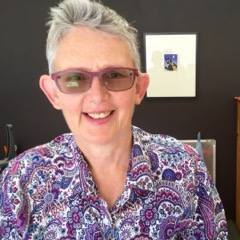
Dr. Wendy McIntosh PhD
Sometimes the obvious connections slip to the edge of my consciousness. I had not made a specific link between professional boundaries and cultural bias until a couple of weeks ago.
I was invited to facilitate a seminar for Interpreters on the theme of Cultural Bias. As I was researching content for the seminar, and more specifically, from the discussions during the seminar, light bulbs started going off in my brain. Neuroscientists would say it was the sparking of my neurons – however, I like the image of the light bulb, I guess I just have to be careful when I switch the light bulbs off and on.
As I started to reflect after the workshop, and in the days following, I could see many intersections where cultural bias plays a role in boundary transgressions. My frame of reference for culture in this blog are the two definitions below:
“Culture in its broadest sense is cultivated behaviour; that is the totality of a person’s learned, accumulated experience which is socially transmitted, or more briefly, behaviour through social learning”
“A culture is a way of life of a group of people–the behaviours, beliefs, values, and symbols that they accept, generally without thinking about them, and that are passed along by communication and imitation from one generation to the next”
Often participants who attend our Professional Boundaries workshops, bring stories for us to explore. They share their personal selves 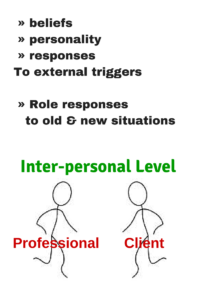 and the beliefs and biases from their families of origin, schooling, communities and many other cultural groups that they have belonged to. Usually in my interactions with participants, they talk about their own moral compass, what it means to care, what it means to be a good person, what it means to help from their cultural experiences. And that’s where the intersections between professional boundaries and cultural bias occurs. The clash between the personal moral imperatives and the professional requirements.
and the beliefs and biases from their families of origin, schooling, communities and many other cultural groups that they have belonged to. Usually in my interactions with participants, they talk about their own moral compass, what it means to care, what it means to be a good person, what it means to help from their cultural experiences. And that’s where the intersections between professional boundaries and cultural bias occurs. The clash between the personal moral imperatives and the professional requirements.
At the beginning of a workshop, I warn participants that much of the content may be quite confronting for them, as they wrestle with the ways in which their personal cultural bias may be in conflict with the work they are required to do.
Cultural bias exists when an individual navigates the experiences of others, through the framework of their own personal compass of cultural experience.
I have noticed that when I examine the multiple reasons for boundary transgressions (crossings and violations) it’s important to explore three different levels – the intra-personal (including the emotional, psychological and physical experience in the professional), the inter-personal (the experience between the professional and the client), and organisational / systemic influences, and conflicting expectations that can impact the interpersonal relationship.
With so many influences occurring simultaneously, it is important to be able to clarify, as quickly as possible, what personal cultural bias may also be interfering in the interpersonal relationship.
However, in my experience professional boundaries and cultural bias does not stop at the inter-personal level.
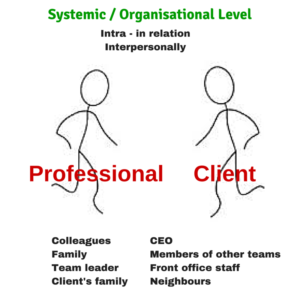 Consider cultural biases that could be occurring in your organisation in relation to professional boundaries. “It is expected staff will go the extra mile”, “if it makes the client happy then …”. I am sure you can think of many others.
Consider cultural biases that could be occurring in your organisation in relation to professional boundaries. “It is expected staff will go the extra mile”, “if it makes the client happy then …”. I am sure you can think of many others.
In his book The Power of Habit – Charles Duhigg (2013) discusses the dangers inherent in cultures where there is professional disregard between two professions. The examples Duhigg cites are between nurses and doctors and poor cultural responses to bullying that enable dangerous practices to occur.
When dangerous habitual behaviour occurs intra- and inter- professionally – then there is real cause for concern. Lives can be at risk.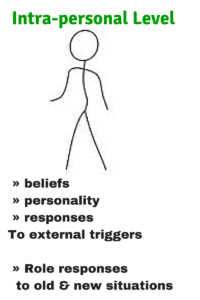
As I reflect on this theme of professional boundaries and cultural bias I find that I am considering my own cultural bias when I deliver boundary workshops. I think I will keep those reflections until the next workshop. To give you a clue however, I like this notion of cultural competence from Bainbridge et al:
“ a set of congruent behaviours, attitudes and policies that come together in a system, agency or among professionals and enable that system, agency or those professions to work effectively in cross-cultural situations” (Bainbridge et al, 2015 p2).
Tune in to your own responses to clients (or colleagues) in your next interactions – what is guiding your purpose, how much of what you do and say is led by cultural bias that you have towards the individual and the choices they wish to make.
References
Bainbridge, R., McCalman, J., Clifford, A., Tse, M. (2015). Cultural competency in the delivery of health services for Indigenous people. Issue paper No. 13. Clearing the gap, cleaning house. Australian Government. Australian Institute of Health & Welfare & Australian Institute of Family Studies.
Duhigg, C. (2013). The power of habit. Why we do what we do and how to change. Random House: London.




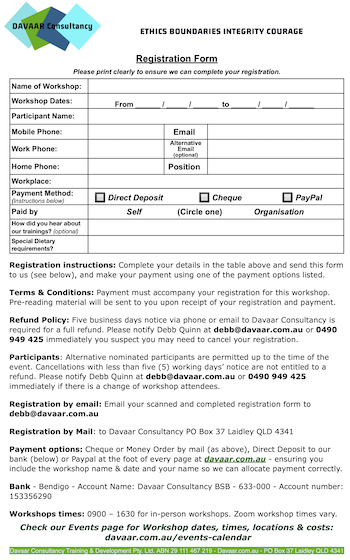 our registration form
our registration form